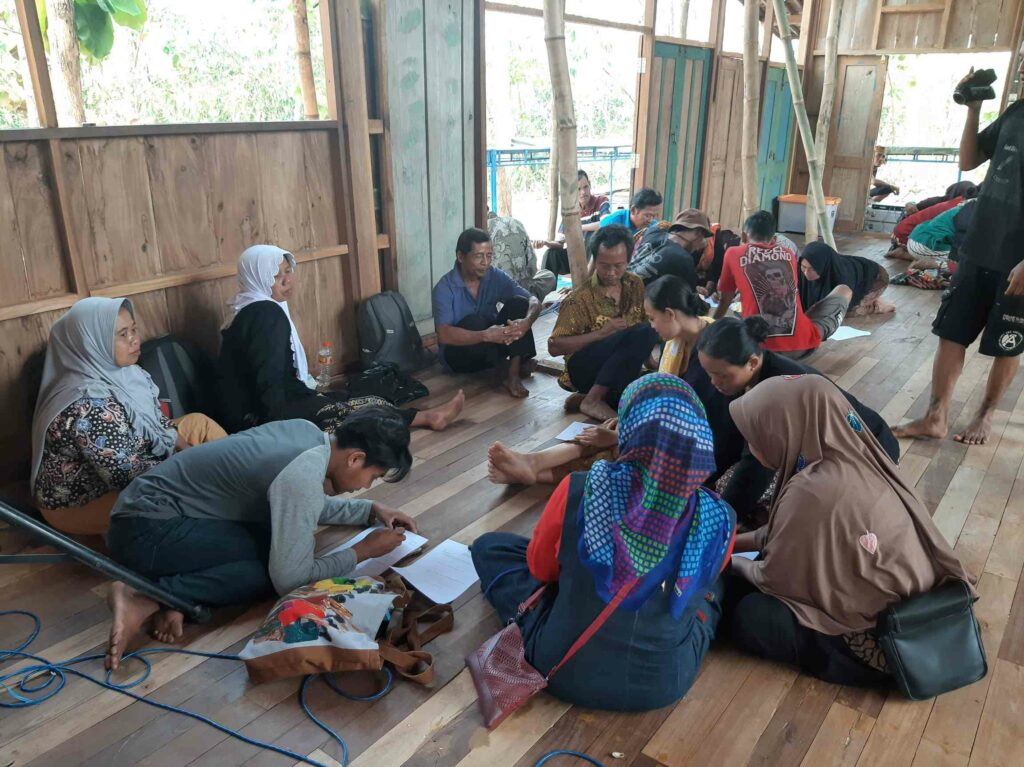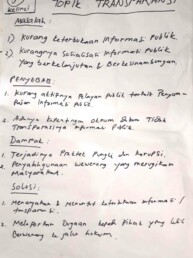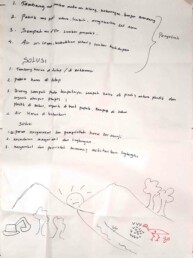Community participation is needed to ensure the implementation of appropriate and equitable development policies. This is stated in PP No.45 of 2017 concerning Community Participation in the Implementation of Regional Government. In practice, the role of the community in this matter is still not optimal. The main cause is less understanding on the scope and aspects of supervision that can be done. Therefore, capacity building is needed so that the public can better understand their rights as citizens and they can carry out their supervisory functions effectively and optimally, and also able to measure the accountability and integrity of the implementation of development programs.
According to these conditions, PWYP Indonesia together with LBH Semarang and the Kendeng Mountains Concerned Community Network (JMPPK) held a community gathering and social audit training entitled Legal & Training Dialogue: Community Participation in the Implementation and Supervision of Development on Saturday (26/10/2019) last week. About a hundreds of people crowded the multipurpose room in Langgar Yu Patmi, in the Village of Larangan, Tambakromo District, Pati, Central Java. Gun Retno, as the coordinator of JMPPK, explained that this event was held to commemorate the 1000 days of Yu Patmi’s death. Yu Patmi is a Kartini Kendeng from Pati who passed away after a series of actions held in front of the Merdeka Palace in order to voicing the sustainability of the Kendeng Mountains.
Entitled “Nyewu Yu Patmi Nukulke Patriot Bumi” (Thousand Days Yu Patmi Regrowing the Patriot of Earth) Gun Retno hopes that Yu Patmi’s soul can inspire other people to become new patriots which able to continue the struggle in preserving the environment.
State Law and Citizens’ Rights
The social audit training began with a discussion session moderated by Andri Prasetiyo (Researcher of Publish What You Pay Indonesia). This discussion presented a number of speakers such as Nimeradi Gulo, who is also a legal assistant for the Kendeng citizens, Rizki Agung Firmansyah and Mujadid Salim from the Anti-Corruption Study Center and the Law Faculty Law Program (CACCP FH) UNAIR, and Tenti Nawari Kurniawati (Director of the IDEA Association).
In his presentation, Nimeradi Gulo explained that the Indonesian state was founded by the founders not as a state of power but a state of law. Thus, this country must be run by complying with applicable law. Gulo also briefly related to attitudes of lawlessness. Gulo gave an example by referring to the Central Java government who was not compliant with the law by ignoring the decision of the Supreme Court’s verdict in favor of the Kendeng Farmer suit. In fact, the Governor of Central Java, Ganjar Pranowo, took a counterproductive action by giving a new permit for the construction of a cement factory in the karst mountainous in Rembang, Central Java.
Furthermore, the conception of the law itself according to him is required to contains moral and justice. So, if a “law” is made without moral and justice value, then that is not a law but power. Thus the people as the supreme sovereignty holder must monitor and straighten it.
Especially in terms of natural resource management. As shared wealth, the governance carried out by the regional government must be carried out properly and as fairly as possible. Because he added, “the end of the state law principle is the creation of public order and welfare”. Therefore, it is the duty of citizens to dispel any inappropriate actions, including what is currently being faced by people in Kendeng relating to the continued operation of mining activities that are not in accordance with regulations.
On the other hand, Agung from (CACCP FH) UNAIR described in detail the threat of the Land Bill which was later discussed by the government. One of them is the potential return of the domein verklaring concept in Indonesia, where all land which people cannot prove who the land belongs to, it means that the land belongs to (eigendom) the state.
In addition, a number of other controversial articles, he added, should also be criticized include the existence of a Land Bank that allows to the liberalization in agrarian sector, the emergence of New Management Rights (HPL), the closure of HGU information, also the articles that potentially giving an increase of criminalization to the land defender.
Mapping The Development Issues
In the afternoon, the activity continued to social audit training. Tenti (IDEA Yogyakarta) as the facilitator, explained the basic concepts to participants about the role of citizen supervision and its procedures through the available institutions. He wants to encourage each participant to be actively involved in the implementation of regional government to ensure their rights are fulfilled.
Because for Tenti, the most important thing in the movement is the increasing of capacity in community groups as well as strengthening the organizations. The organizing agenda, she added, “must be done within the stages starting from villages, districts, to the provincial and national levels.”
 Group discussion activities by participants
Group discussion activities by participants
Dalam format diskusi dan lingkar belajar partisipatif, warga antusias untuk berdiskusi dalam kelompok kecil membahas konsep hak warga negara, dasar regulasi, memetakan permasalahan dalam berbagai aspek yang dekat dengan kehidupan seperti lingkungan hidup, pendidikan, kesehatan, infrastruktur, transparansi dan penegakan hukum.
Within the format of discussion and participatory learning circles, participants are enthusiastic to discuss in small groups discussing the concept of citizens’ rights, basic regulations, and mapping issues in various aspects close to life such as the environment, education, health, infrastructure, transparency and law enforcement.
Participants in the group were asked to mapping the topics in terms of problems, causes, impacts, and solutions that were thought of. This mapping is crucial not only as an effort to identify problems together, but also to encourage every person to be involved and willing to voice their idea. Because the topics that have been mapped must be presented in front of the group. This session show that participants who previously did not speak much slowly want to express their feel.
Posters as a result of identification and analysis by groups in community.
In some cases, such as on environmental topics, community representatives explained that many mining permits and activities in their areas were not transparent and not considering the views of local residents. A number of environmental problems such as dust, pollution and water crisis are complained by residents because have an impact on their health and economic aspects especially in the agricultural sector. The people also highlighted criminalization case when they trying to protect the environment. This has become a serious things in the action to defend their rights.
The Meaning of Social Audit Training for Kendeng People
After a long series of discussions, the training activities continued with evaluation. Gunarto, one of the participants from Sikep Pati Citizens, claimed that the activities he had participated in for the whole day were very useful. He became more aware of a variety of basic public services that should be obtained as citizens.
Moreover, an understanding of the public’s right to supervise public services that were previously considered taboo by most participants was also increasingly realized after the training. “Now, as a citizen, I have better understanding of how to conduct surveillance through available channels such as the Village Consultative Unit (BPD), the Police, and related institutions at the Regency and Provincial level,” said Giyem, from Tambakromo Pati.
Statistically, we note that there are an increase in understanding which can be observed from the results of the Pre Test and and the Post Test that were given. In that form, residents were asked to answer a number of questions about the issue of public service and supervision of the development. As a result, the overall score in average rise up from 55.7 in the Pre Test to 83.3 in the Post Test session.
As a follow-up, the activity ends with the decision of the Sedulur Kendeng action plan, especially in order to respond the Central Java Government’s policies. It is hoped that what has been learned during the training period can be implemented in the JMPPK agenda particularly in monitoring the implementation of the RTRW and RPJMD in Central Java.

